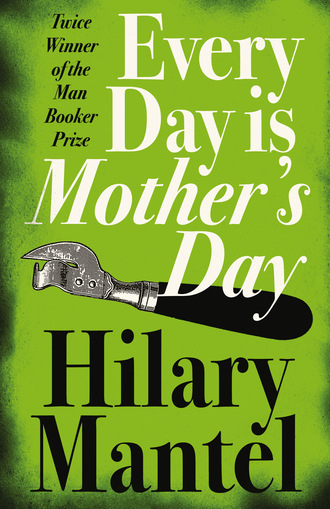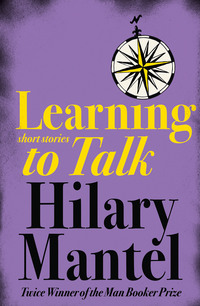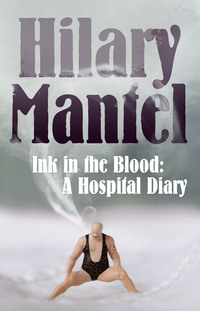
Полная версия
Every Day Is Mother’s Day
She mounted the stairs heavily. Her rheumatism was worse this year, in the raw damp April weather; every day sodden petals from the flowering trees flurried across the window, and thrushes sang in the neglected garden. I am sixty-eight, she thought, I am feeling my age this year.
‘Don’t you know it’s Thursday?’ Evelyn said sharply. Muriel raised her head. She nodded. Evelyn appraised her; the lank black hair cut straight across her forehead, the coarse flaking skin, the ungainly legs and large red hands. Whatever they say, she thought, she has not improved. Whatever they say, is rubbish. ‘Well, then, we must sort you out some clothes.’
A sign of animation crossed Muriel’s face. She got up. Crossing to her chest of drawers, she proffered Evelyn her pink cardigan of fluffy wool. Evelyn nodded without interest. ‘If you like.’
Something caught her eye. She plunged her hand into the drawer and delved for the metallic glint. She held it in her palm as if it were contaminated; a tin of furniture polish, half-used, its waxy rag still stuck inside it.
‘Did you put it there?’
Muriel’s pale grey eyes gazed at her. She showed neither guilt, nor fear, nor surprise. Evelyn believed her. Muriel never did anything of her own volition; Muriel never lied.
‘They’ve been in here, then?’ She reached out to grasp Muriel’s arm above the elbow, squeezing it hard. She was a strong woman. Her fingers bit into the flesh. Muriel blinked at her. ‘Did you see them?’ She shook her daughter’s arm. ‘Tell me what they did.’
Evelyn’s pulse raced. Until now they had never been in this room. But now here was the proof of it, the tin taken some weeks ago. It was always the same kind of trick; the spilt sugar, the small thefts, the china they had smashed piece by piece. She let Muriel’s arm go and it fell limp at her side.
‘1 could move you from here. But where would you go? They are always getting into my bedroom.’
Muriel said that there was a third bedroom. Evelyn stared at her. She could feel again her heart hammering and pounding in her throat. The woman had made a shocked face when she had called Muriel an idiot. She, Evelyn, lived with the daily confirmation of her idiocy. Only a hopeless idiot would suggest she took up residence in a room already tenanted; and such tenants. ‘Wash yourself,’ she commanded her. She went downstairs.
At ten past one she called up to Muriel. Muriel came down. She wore the fluffy pink cardigan and a red skirt. She showed none of the caution Evelyn used when she moved about the house. Sitting on the step next to the bottom, Muriel put out her feet for her shoes to be laced, her legs stiff like a child’s in the dentist’s chair. There was something almost sly in Muriel’s face. But Evelyn never troubled to interpret her expressions; she could speak, if she wished, she could make herself clear.
‘If you can make baskets, why can’t you tie your shoes?’ Evelyn said brutally. Probably, she thought, the reason is that she cannot make baskets; if the other week’s example is anything to go by. She took Muriel to the door. She had only to walk fifty yards, along the bushes, around the corner to Lauderdale Road. Let her do that by herself, the Welfare woman had begged; to give her a little sense of independence. She had looked at the woman with contempt. In those days she had been very high-handed with them. She had underestimated their persistence. They had kept coming back. Now she was ready to do anything they said, to make the sacrifice of Muriel, if only it would stop them coming to the house, enquiring into the arrangements she found it necessary to make, the shifts and expedients by which she kept them washed and fed and warm from one day to the next; sniffing around with their implications that life could be improved.
She held the door open to watch Muriel out of the gate. Florence Sidney was passing, a stout, well-set-up woman. She had the house, now that her mother had been taken away to a home. It was Florence Sidney, Evelyn thought, who reported us to the Welfare. As if persons in our class of life needed the Welfare. Miss Sidney turned her bonneted head curiously, and Evelyn drew back and slammed the door. She turned to the house, alone; so often, in the 1940s, she had wished she were alone, and now her wish had come back to mock her, to gibber and tiptoe and hiss.
They had not eaten lunch. That was Muriel’s punishment for not speaking when she had been asked about the visitors to her room. Whether something she had seen had terrorised her into silence…Evelyn wondered if she had been unjust. It was too late. Still, she would have her tea and biscuits.
On the floor of the hall lay a crumpled piece of paper. Evelyn’s gorge rose. Low stinking entities, she said to herself. Once she had been able to smell them, but her senses were becoming blunter with age. Increasingly they were choosing this method of communication, this, their tricks, the sharp raps on the wall from different rooms of the house, warning her off by their noises or luring her by their silence. She stopped. Her face twisted. She tried always to avoid showing that she was in pain. It was agony for her to bend to the floor, they must know this. Evelyn looked around. She took her umbrella from the hallstand, and with it fished for the paper, dragging it from where she could not reach, like the intelligent ape in the experiment. From her feet, she scuttled the paper ball to the first stair, from there to the second. She picked it up and straightened it out. The wavering great letters were familiar by now, fly-track thin: GO NOT TO THE KITCHIN TODAY.
Evelyn’s heart sank. Like this, they prolonged her existence. They could take her at any time, kill her (broken neck at the foot of the stairs) or leave her a shell without faculties. But they preferred to watch her fear, her pathetic ruses, her flickering hopes which they would dash within the hour; that was the only explanation. Disconsolate, she entered the front parlour. There, placed precisely in the centre of the circular table, lay a tin-opener.
At once she thought, how provident. It was a matter in which she had been careless. She did not touch it, examined it with her eyes. It did not belong in the house, she had never seen it before. Carefully, she picked it up. It was new, quite new. It was the first time they had left her a gift.
She lowered the flap of the sideboard and took out a tin of baked beans. I must make better arrangements, she thought. The days when they forbade her the kitchen were becoming more frequent, they were driving her increasingly to the front parlour with its hard chairs where she had seen the dead. Perhaps, she thought, a paraffin stove. She opened the tin, and cast around. To hand came the heavy glass ashtray, unused since Clifford died. She emptied the cold tan slime into it and sat eating the beans with her fingers. When she had finished she put down the ashtray and sat resting for a moment. Now where would she go, until it was time for Muriel again? The blue light bounced off polished wood. The air was silent, serene. Evelyn breathed deeply. All their ingenuity had satisfied itself, for the afternoon. Travelling around the room searching the corners, her eye fell on the basket which Muriel had brought home two weeks ago from the Handicapped Class. It was a very ill-made basket, very mis-shapen. Evelyn could not think what use to put it to. Because she was very considerate about Muriel’s feelings, she had not discarded it. Now she took it and hobbled out with it to the hall, where she placed it on the table, for display. As an afterthought, she lifted the dead plant in its plastic pot, and placed it inside.
AXON, MURIEL ALEXANDRA
III/73/0059
Client has attended the Calderwell Rd Day Centre once weekly for three months. Whilst we await a comprehensive appraisal, it must be stressed that the ongoing observations of the Day Centre staff have had a great part to play in analysing the client’s difficulties, as in applying multifocal measurement tests it is essential to take into account the degree of emotional retardation probably partly induced by her home environment.
Preliminary estimates suggest that the client has an IQ of around 85 on the Stamford-Binet scale, and that therefore her potential and capabilities are somewhat greater than we were led to expect from History III/73/0059. Whilst the need for special facilities may have been indicated at an earlier date, it is suggested that client when in contact with education professionals suffered from a degree of retardation not readily distinguishable from borderline normality, and thus was not brought to the attention of the Social Services; however, due to impoverished environment her emotional condition has worsened and she is now subsisting at a marginal level of social adequacy.
Client has achieved basic literacy, but as she lacks concentration and motivation no occupational adequacy is envisaged for the future. In carrying out simple mechanical tasks, which are well within her capacity, her lack of sustained self-direction is seen. A marked flattening of affect may give rise to the suspicion of a schizoid or sub-schizoid state. Emphasis must be given to social adjustment and interpersonal relations, and inculcation of a maximum degree of self-direction, and efforts must be directed towards helping to attain a satisfactory level of social independence. Subaverage intellectual functioning may be compensated for in this case by sequential development of self-help skills.
M. S. BYRNE, MA
Community Daycare Supervisor
Dear Jacki,
Sorry to bother you on this one but since my transfer has come up so suddenly Norman suggested I dump this one on you, and you do a home visit this week. I should warn you that in my opinion the old woman is completely gaga, but I don’t see what we can do.
Cheers,
CATH DAWSON
III/73/0059
Home Visit, 23.9.73.
Explained to Mrs Axon that Miss Dawson had been transferred. Client appears well. Mrs Axon stated that she was dissatisfied with client’s progress, but that she had not expected her to make any progress. Explained to Mrs Axon the various activities in which client participates at Community Care Sessions. Enquired why she had not told Miss Dawson that client able to read and write. Mrs Axon stated ‘Because it would have been a lie.’ Explained to her that client’s achievement was on a basic level. Nevertheless this was a very praiseworthy attainment and client should be given every encouragement to use her skills. Asked client if she would show her mother how she could write. Client agreed that she would do this but when supplied with paper she scribbled on it. Mrs Axon stated ‘It is plain that you are all fools and fools in charge of fools.’
Introduced the subject of client’s longterm care. Mrs Axon expressed the idea that client would be left alone in the house (presumably meaning after she herself was dead). Mrs Axon did not appear to be able to verbalise the idea of her own death. Explained to her that Muriel had been placed on the waiting list for five-day care at the Centre and that in the event of her decease a place would be found for her in a residential institution or hostel. Mrs Axon stated ‘Do you mean Holloway?’ and when this queried stated ‘She has murderous inclinations.’ Did not clarify this statement. Asked Mrs Axon about her own physical health and whether she felt able to care for Muriel as of the present time. Mrs Axon stated that her own health was excellent. Suggested that client might be able to do more for herself if encouraged. Surprisingly in view of her previous statement Mrs Axon said that client had always been a good and obedient girl and that she had never been any trouble from her birth. Suggested to Mrs Axon that Muriel was no longer in this position now i.e. no longer a girl. Mrs Axon stated that if Muriel was ‘any trouble’ she would hold caseworker responsible. Mrs Axon’s attitude on this visit was most unfriendly.
J. S. S.
Dear Sister Janet,
When you come on duty will you try if you can stop Muriel putting her hand in the tea-money again. M. S. Byrne MA says she had a need to do this as in the present state of her she needs to take things not be given as part of her identity, or autonomy, one of those. It isn’t her first time thieving so if I were you I’d bring the box at half past three and lock it in the medicine cupboard till you see the back end of her, then she can have her autonomy on Mpoe’s shift next week.
Love,
NORAH
Muriel is walking along Lauderdale Road. Muriel is observing Muriel walking along Lauderdale Road. Off the bus; like puppets of wood the people on the bus nod their heads and jerk their arms at her. She understands it to be their ceremony of farewell. Rigidly, as if saluting some dictator, she raises her right arm in imitation. Always she finds the outward forms the best, the safest. The people on the bus seem perfectly satisfied. She smiles to hèrself.
Off the bus at the junction of Buckingham Avenue and Lauderdale Road. This is the blind side of the house. Along Lauderdale Road to the end; cross the road; turn. Back along the opposite side. Along the road, in at the gate. No purpose in the detour, except that Evelyn will never know. But wait:
There basking in the weak sunshine is the dog known as pedigree wire-haired fox terrier. Between its paws, a big bone licked clean. Muriel stoops. As her fingers creep towards the bone, the dog wakes and leaps to its feet, a growl in its throat. Muriel extends one of her stiff legs and lace-up shoes and kicks the dog in the ribs with all the force she can muster. The dog known as pedigree wire-haired fox terrier flees, yelping. Around the corner. In at the gate.
Evelyn opens the door without speaking. She shuffles towards the back of the house. The living room is safe then, Muriel thinks sardonically. Muriel stares at the dull floor, at the table. I could be that floor, she thinks, that very floor to walk on; things placed upon it. I could be the thing that is placed. The familiar panic begins to rise up inside her. As her fingers close over the bone in her pocket, her heart slows.
That morning Evelyn had shouted questions at her. Evelyn had taken by the arm and shaken the girl known as Muriel Alexandra Axon. Whenever this happens, Muriel creeps out, a midnight flitter; she watches from the other side of the room. Evelyn thinks she knows who she is talking to; she does not know that she is shaking a table or a floor, a dead planet, a pebble on a beach. It is most satisfactory. It shows how little Evelyn knows of the true state of affairs.
Once, some years ago now, Muriel realised that her mother could not read her mind, or not all of it. She tested this. She thought certain thoughts, like: I will kill you. Then many times a day Muriel would think thoughts, rejoicing in the deception. I will trip you down the stairs and break your neck. Mother mother mother. Muriel eat your soup spilling it like that. Clumsy girl. From thoughts, short steps to action. Evelyn did not know that she had walked along Lauderdale Road, that she had a bone in her pocket, or five coins from the tea-money. Unless…still, Muriel was not sure how much she knew. This was why, when Evelyn spoke to her, she became like an empty cavern. Muriel Alexandra’s body stands irreproachable like a guardsman on parade, while her thoughts slip off to gambol and strut, enjoying their own existence.
GO NOT TO THE KITCHIN TODAY.
Evelyn explains. They go into the front parlour, and drink the cordial with the lukewarm water. Tomorrow, Evelyn thinks, if there is no message, I must remember to fill the jug. Or I could take it upstairs, and fill it in the bathroom.
Muriel remarks that the orange juice is very nice. Evelyn says kindly. ‘You are a good girl, you appreciate what is provided for you.’
And again Muriel smiles. The orange juice is revolting; she thinks so. She marvels constantly at how easy it is to deceive. She wants one of the tins of meat; all evening she cherishes her longings and her hunger, the feelings she has that Evelyn does not know about. At eight o’clock Evelyn says, ‘We could have a tin of meat.’
Inside, Muriel squirms in pain. Her thought has been read again. Dragged, filleted, out of her living head. But she struggles to keep the smile on her face; and Evelyn thinks she is pleased at the suggestion. Muriel is beginning to feel the victor; she can keep changing the rules, Evelyn cannot win. Unless…still, it might be possible that she is Evelyn. That Evelyn is growing inside her. Go, go, she thought savagely: I did not invite you here.
Nine o’clock; Evelyn nods in her chair. She is growing deaf, Muriel thinks, old and deaf. Stealthily she moves out to the hallway. It is not until Friday morning that Evelyn goes through her pockets. First she takes the money, spreading it out on her palm; five, five pieces of money. Then the letter in its brown wrapper. Where? She looks around. Her mouth twists. She puts her hand to it in alarm. That was Evelyn’s mouth twisting, Evelyn growing inside her.
In panic she spreads out the money and counts it again; five. And there is the dead plant, all its leaves gone now, nothing but the brown withered stalk, standing in a basket made by a person they have taken to be Muriel Alexandra Axon. Carefully she lifts out the plantpot; folding the letter in half, she places it in the bottom of the basket. (And you be sure you give it to your mother, won’t you now, Muriel?) Back goes the plant. She takes the bone. It is still slimy from the jaws of the dog called pedigree wire-haired fox terrier. Outside the door of the front parlour she listens. Only Evelyn’s breathing; she snickers in her nose, her lower jaw droops on to her chest. Muriel enters the kitchen. There is the teapot from this morning, the breakfast toast, all the remains from before Evelyn received her message from the spirits. Muriel picks up the box of matches, selecting carefully the one that will do the job. From the drawer she takes three tea-towels; white and blue check, white and yellow check, sights of Southport. She puts them in the sink to burn them. The first match goes out, and the second. But she has seen a man, when he lights his cigarettes, shielding the flame with his hand. She takes pleasure in the fact that no one will ever know where she learned this trick. In time she can throw the charred debris on the floor, surrounding the bone. And the pedigree wire-haired fox terrier will never complain, she knows that; when she walks along the Avenue again, she will see the resentment locked in its yellow eyes, and the dumb unproductive movements of its jaw.
Evelyn wakes with a start at Muriel’s hand on her shoulder. ‘Yes, yes,’ she mutters, ‘it’s time we were getting to bed.’ She takes up the poker which she always carries with her when she moves about the house after dark. All the lights will be left burning tonight; that is the least discouragement one can give them, she tells Muriel. Muriel mounts the stairs behind her. Muriel’s shoulders droop. Her knees stiffen, her hand quivers for support on the banister. At each tread she feels pain, she grimaces, she gasps a little. All her resources for today are played out. She is becoming Evelyn, for the night.
Department of Social Services
Wilberforce House
1st May, 1974
Dear Mr Byrne,
You will be pleased to know that we have persuaded Tarleton’s Hardware not to press shoplifting charges against Miss Muriel Axon, regarding the removal of a tin-opener which occurred when a small party of clients was taken on a shopping expedition last week.
Fortunately Mr Tarleton was most reasonable when the situation was explained to him. However we cannot count on meeting this forbearance from shopkeepers on other occasions. I should therefore be obliged if you would request your staff to exercise great vigilance when taking clients out of the Day Centre grounds. This type of incident, if publicised, can have a very unfortunate effect on public relations between the department and the public.
The caseworker involved here tells me it would be unwise to let Miss Axon’s mother know of this incident, as she appears to be a woman of exceedingly old-fashioned moral values and her already extremely negative attitude to Miss Axon is compounding our difficulties in this case.
I should also be obliged if you would not mention this to the nursing or other care staff.
Sincerely,
SUZANNE CLEGG
Principal Social Worker
Dear Sister Janet,
This is just to tell you that Muriel got let off the bit of thieving she did when Mpoe took them out the other week to have their autonomy. I know because I heard M. S. Byrne MA bawling Mpoe out for not keeping her eyes open when they came out of the Chocolate Kabin, I think he’s had a rocket from Clegg. What the devil do you think she wanted a tin-opener for? Between you and me I wouldn’t mind if we could lose Muriel when we get demolished.
Love,
NORAH
And Thursday.
‘This day last week some beast was murdered in the kitchen,’ Evelyn said. Oh, can they die, Muriel asks. Evelyn tries, without much hope, once more to explain to Muriel. There is more than one set of persecutors. There are the tenants with their constant jibes, their petty destructiveness; it was not (she pats her daughter’s arm) a human creature. It is possible to see them, quite possible, but they are very quick. You must learn to look for them out of the corner of your eyes. If people did learn to look out of the corners of their eyes, they would see a great deal that at present they miss; and most of it would be to their disadvantage.
But the other inhabitants, their effect is more—she presses her hand to her ribcage. In the soul, she wants to say, but she wonders if Muriel has a soul; if she had, and they took it away. I fear…her seamed face works a little in distress at her thoughts. She makes a gesture like someone erasing the writing on a blackboard; after which, the board itself remains.
She looks different, Muriel notices, more harassed, more starting and looking in corners. Since last Friday’s discoveries.
She is fumbling in her purse now. She lays out certain coins on the kitchen table.
‘For your tea and biscuits,’ she says.
Muriel lets them lie for a time. She practises fixing her eyes on Evelyn but looking straight through her to the wood of the cupboard at her back. She practises wiping all thoughts out of her mind. At the same time she must watch Evelyn, to see that she is still mumbling over her own concerns, not looking up with the comprehension she dreads. Finally, when Muriel can bear the suspense no longer, she snatches up the coins and holds them in her hands. Evelyn lays out more on the table. ‘For the milk-money. Tomorrow.’ Evelyn shuffles out of the kitchen, but in a moment she is back. ‘My envelopes,’ she says, her voice querulous. ‘My white envelopes for putting in the milkbottles. They have torn them all.’ She opens the kitchen drawer where she keeps her ration books and ends of string, her paper bags and cotton reels and farthings.
‘Lock and key,’ she says. ‘I shall have to buy more and keep them under lock and key.’
She tears the corner of a paper bag and puts the money into it. She folds the remainder of the bag and puts it back in the drawer. Once again tomorrow he will take the money and go away, without having to knock at the door; when the price goes up he will put a note through the letterbox. They have teased her so often with their rappings that she tries not to go to the door for any unnecessary reason; tries not to set the precedent of being in a certain place at a certain time, in case they set traps. Suddenly vindictive, she turns to Muriel: ‘I think of stopping you going to these Handicapped Classes. What good does it do? I think of stopping you.’ In a monotone, Muriel begins to repeat her words. ‘Stop it, stop it,’ Evelyn screams at her. There is terror in the girl’s face. Evelyn waddles from the room.
And once more: the match rasps against the box, the flame wavers up; Muriel watches her flesh shrinking away from the heat, and feels pain. She allows the flame to play over her wrist until it burns out in her fingers. Feels, feels. Taking the scissors, uses the point to draw blood. Again, feels.








